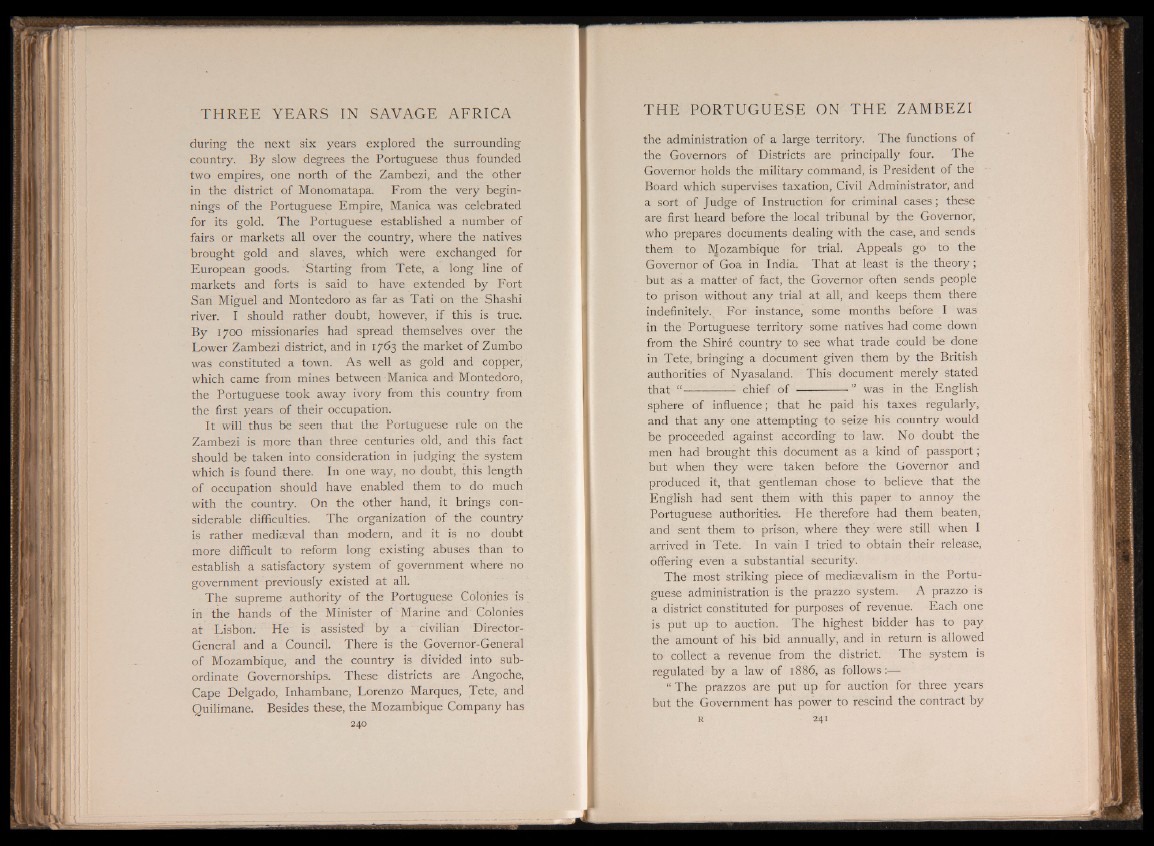
during the next six years explored the surrounding
country. By slow degrees the Portuguese thus founded
two empires, one north of the Zambezi, and the other
in the district of Monomatapa. From the very beginnings
of the Portuguese Empire, Manica was celebrated
for its gold. The Portuguese established a number of
fairs or markets all over the country, where the natives
brought gold and slaves, which were exchanged for
European goods. Starting from Tete, a long line of
markets and forts is said to have extended by Fort
San Miguel and Montedoro as far as Tati on the Shashi
river. I should rather doubt, however, if this is true.
By 1700 missionaries had spread themselves over the
Lower Zambezi district, and in 1763 the market of Zumbo
was constituted a town. As well as gold and copper,
which came from mines between Manica and Montedoro,
the Portuguese took away ivory from this country from
the first years of their occupation.
It will thus be seen that the Portuguese rule on the
Zambezi is more than three centuries old, and this fact
should be taken into consideration in judging the system
which is found there. In one way, no doubt, this length
of occupation should have enabled them to do much
with the country. On the other hand, it brings considerable
difficulties. The organization of the country
is rather mediaeval than modern, and it is no doubt
more difficult to reform long existing abuses than to
establish a satisfactory system of government where no
government previously existed at all.
The supreme authority of the Portuguese Colonies is
in the hands of the Minister of Marine and Colonies
at Lisbon. He is assisted by a civilian Director-
General and a Council. There is the Governor-General
of Mozambique, and the country is divided into subordinate
Governorships. These districts are Angoche,
Cape Delgado, Inhambane, Lorenzo Marques, Tete, and
Quilimane. Besides these, the Mozambique Company has
240
the administration of a large territory. The functions of
the Governors of Districts are principally four. The
Governor holds the military command, is President of the
Board which supervises taxation, Civil Administrator, and
a sort of Judge of Instruction for criminal cases; these
are first heard before the local tribunal by the Governor,
who prepares documents dealing with the case, and sends
them to Mozambique for trial. Appeals go to the
Governor of Goa in India. That at least is the theory;
but as a matter of fact, the Governor often sends people
to prison without any trial at all, and keeps them there
indefinitely., For instance, some months before I was
in the Portuguese territory some natives had come down
from the Shir6 country to see what trade could be done
in Tete, bringing a document given them by the British
authorities of Nyasaland. This document merely stated
that I — chief of ------------” was in the English
sphere of influence; that he paid his taxes regularly,
and that any one attempting to seize his country would
be proceeded against according to law. No doubt the
men had brought this document as a kind of passport;
but when they were taken before the Governor and
produced it, that gentleman chose to believe that the
English had sent them with this paper to annoy the
Portuguese authorities. He therefore had them beaten,
and sent them to prison, where they were still when I
arrived in Tete. In vain I tried to obtain their release,
offering even a substantial security.
The most striking piece of medisevalism in the Portuguese
administration is the prazzo system. A prazzo is
a district constituted for purposes of revenue. Each one
is put up to auction. The highest bidder has to pay
the amount of his bid annually, and in return is allowed
to collect a revenue from the district. The system is
regulated by a law of 1886, as follows:—
“ The prazzos are put up for auction for three years
but the Government has power to rescind the contract by
r 241